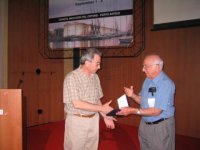2004 – Mike Klein
 At the occasion of the CCP 2004 conference held in Genova, a ceremony took place for the award of the 2004 Berni J. Alder CECAM prize to professor Mike Klein. Michel Mareschal, CECAM director recalled the history of the prize and the importance it has taken in the last years in the Computational Condensed Matter community. Berni J. Alder presented the prize to Mike L. Klein, and, in his presentation reminded the audience of his past collaboration with Mike Klein. Professor Mike Klein, after receiving the award, made a presentation called “Genova to Genova: a 40-year journey in computation”, ending with the following recommendation : “pursue your dreams“.
At the occasion of the CCP 2004 conference held in Genova, a ceremony took place for the award of the 2004 Berni J. Alder CECAM prize to professor Mike Klein. Michel Mareschal, CECAM director recalled the history of the prize and the importance it has taken in the last years in the Computational Condensed Matter community. Berni J. Alder presented the prize to Mike L. Klein, and, in his presentation reminded the audience of his past collaboration with Mike Klein. Professor Mike Klein, after receiving the award, made a presentation called “Genova to Genova: a 40-year journey in computation”, ending with the following recommendation : “pursue your dreams“.
During the past decade, computer simulations have transformed Chemical Physics and Materials Science. Computer Simulation has become an essential tool to predict and analyze the properties of complex (bio)materials. This development is the culmination of four decades of pioneering work that laid the foundations of this field. Professor Klein belongs to the small group of brilliant scientists who transformed Molecular Dynamics from a tool in Theoretical Physics to the workhorse of what is now commonly referred to as “Computational Materials Science”. No single person has contributed on a broader front to the application of Molecular Dynamics and Monte Carlo simulations to practical problems in many different areas of science.
Mike Klein’s leadership has been crucial in the development of a variety of computational tools such as constant-temperature Molecular Dynamics, Quantum simulations (specifically path-integral simulations), extended-Lagrangian methods and multiple-timestep Molecular Dynamics. Professor Klein’s contributions are widely recognized, well beyond the community of computer simulators. He has made important contributions to the numerical study of molecular solids and liquids, hydrogen-bonded liquids, chain molecules, self-assembled monolayers and, more recently, ion channels and biological membranes. Finally, Professor Klein has played a key role in building and maintaining a strong link between the North American and European scientific communities.

 About
About
